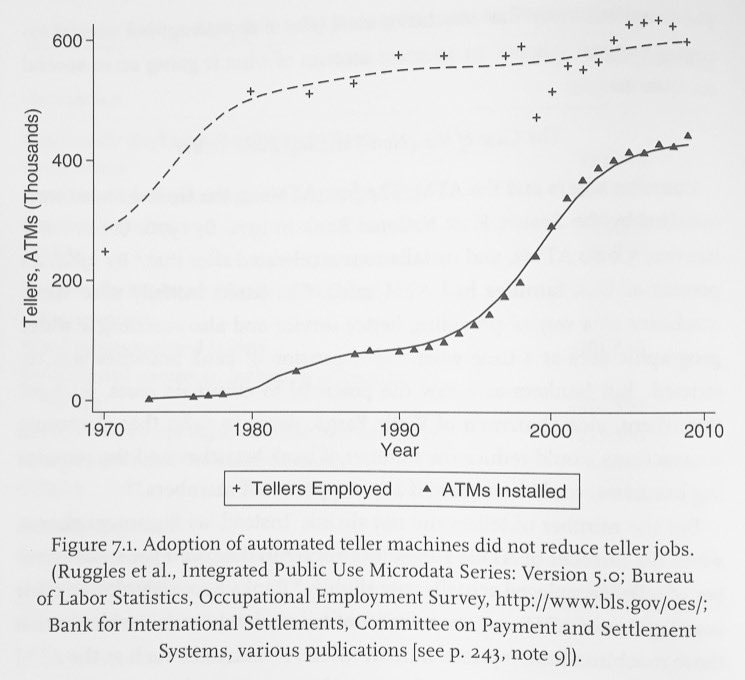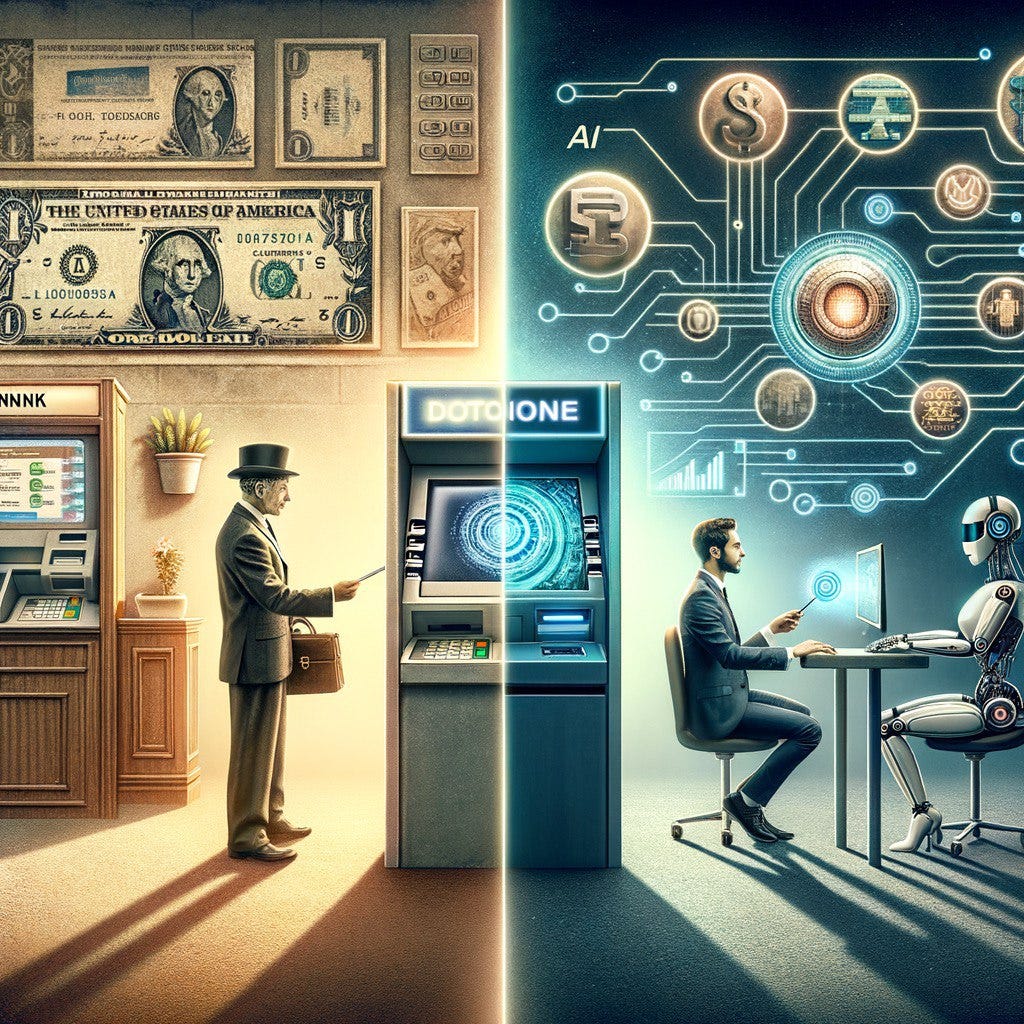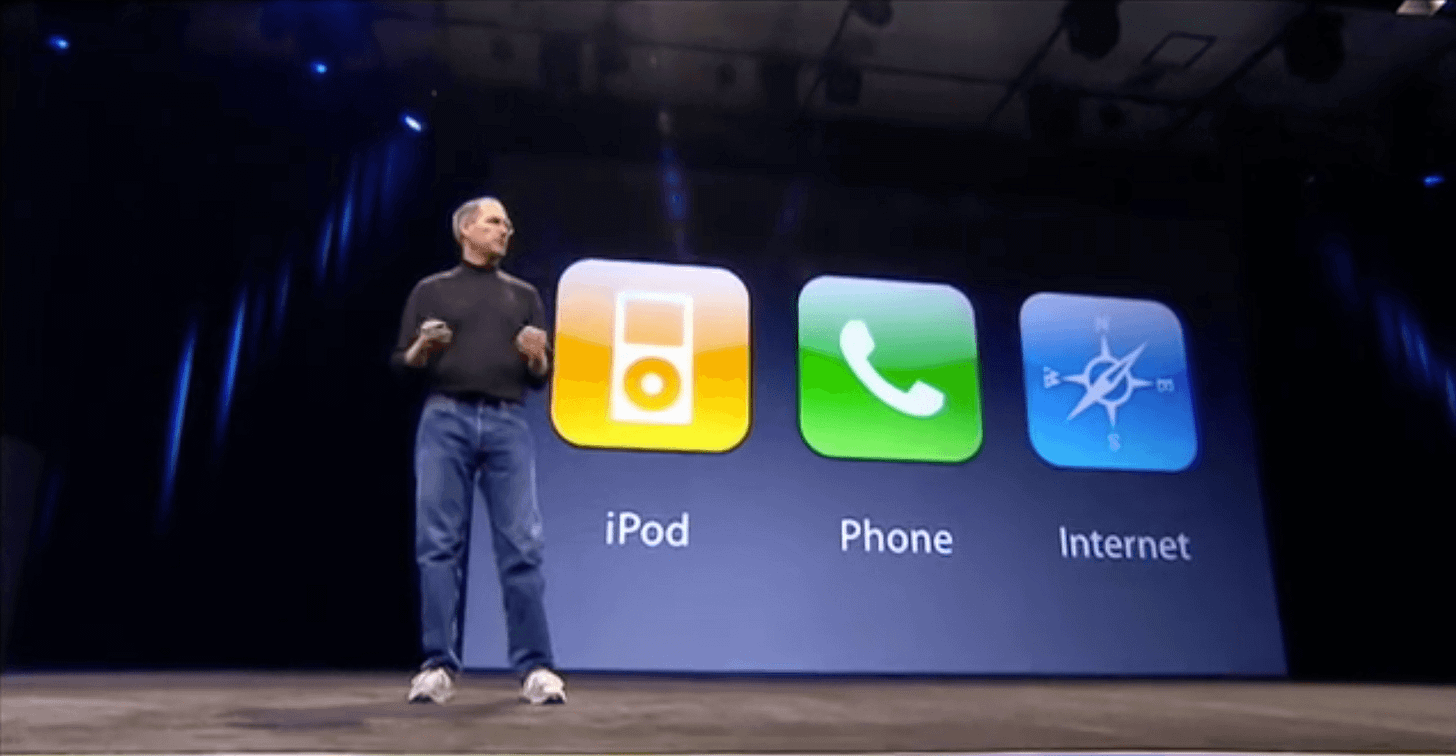AI will change everything... Or not
Historically, every time we made it easier to write code, we increased the need for software engineers. All that AI-generated code will break in very interesting ways that need a human to debug.
“The ATM is the only useful innovation in banking in the last 20 years, it is omnipresent and under-appreciated and allows customers to retrieve cash from street-side dispensers at any time during the day or night.” - Former Chairman of the Fed, Paul Volcker during the height of the 2008 financial crisis.

Artificial Intelligence and different forms of Machine Learning have existed in the closed spaces of the military, government, and academia since the early 1970s.
However, at the turn of the 21st century, AI started to enter the mainstream of homes and commercial spaces. From Terminator, Ultron, and JARVIS in the media, to the Roomba in the early 2000s, the hum of autonomous vehicles, and voice assistants in the early 2010s and most recently OpenAI's ChatGPT in 2020.
With every wave of AI advancement in the mainstream, people talk about how AI will free us from burdensome, repetitive tasks, and enable us to do more. The introduction of new technology and tools have always changed the way people worked, often in ways very few people can accurately predict.
While ATMs reduced the number of bank tellers needed at a branch, they allowed banks to expand their branch networks and reach, effectively leading to an increased demand for tellers and creating new opportunities for expansion, new jobs, and cheaper branches. The introduction of VisiCalc, and later Excel, eliminated the traditional role of accountants but birthed the modern finance department.

Just as the creation of ATMs in the 1960s revolutionized banking, AI will supposedly automate repetitive elements within jobs. AI won’t replace us but make our work less burdensome or easier.
A few people say “Yes jobs will be lost, but there’ll be other things for us to do and new jobs will be created”. We’ll be able to do what these AI-powered tools supposedly can’t do, such as creativity, critical thinking, and efficient problem-solving. Tasks that used to take several days can now be done in minutes (or even seconds), across various industries.

When mechanical switching was introduced in the 1920s, the role of phone operators started to disappear.
Operators in a city that transitioned to mechanical switching were substantially less likely to have any job 10 years later than operators in cities that were slower to automate; those that did find work tended to find worse, lower-paying jobs…. Even though a job that once employed 2 percent of all working women was automated away, new workers entering the labor market were not significantly worse off. — Vox
When telephones became popular, the prospects of phone connectors and operators as a career choice dwindled. Still, phone repairers, installers, OEMs, and even airtime resellers came up within the same industry, solving relatively the same and new sets of problems. Amazon hasn't killed bookstores (yet), and the publishing industry continues to roll on.
AI could be valuable in previously impossible or super difficult research, making new links and connections. But what happens when those links and connections are tenuous, wrong, and just don’t make sense.
Enter Devin
Some 10 years ago, most people believed low-skill, low-wage jobs were most at risk of being automated away.
But now, the concerns of automation impacting blue-collar jobs have fallen behind fears of mass job losses with white-collar, knowledge jobs. In the short term, we're already seeing lots of knee-jerk AI replacements being promoted ahead of their time, some with immediate disastrous results.
Again, it’s hard to say what exactly will happen. Maybe the number of developers per company will decline, but maybe more companies will be created, leading to more jobs in general.
AI could potentially make software creation less expensive, less complex, and less difficult. Now that everyone is a developer, tons of new niche software tools will probably be made.
At the same time, more low-quality software will reach production than ever before. There could be more demand for software engineers, or some other yet-to-be-thought-of role.
Historically, every time we made it easier to write code, we increased the need for software engineers. On an aggregate level, the tech industry should be fine in the longer term. All that AI-generated code will break in very interesting ways that need a human to debug.

Humane, Frame, Rabbit R1, and the Meta Ray Ban glasses have made consumer hardware interesting again, despite their early flops and slow starts. However, these are still niche and expensive products.
The OpenAI and Google I/O demos of May 2024 were interesting, offering a possible glimpse into the future—at least, the future that the current tech overlords want to build. But that future seems expensive.
Sam Altman says he needs $7 trillion, Emad Mostaque of Stability had to resign after raising $126 million and calling AI a $1 trillion bubble, and Mustafa Suleyman (probably AI's biggest celebrity since Ilya Sutskever, Andrew Ng, Timnit Gebru, and Jeff Dean) has, since selling DeepMind for $400 million, bounced from his Inflection AI that raised $1.3 billion to a cushy job at Microsoft.
If the humans responsible for ushering in this future, despite the billions spent, are unable to do so or believe more funding is required, it raises questions about when or if we’ll achieve AGI that’s supposed to disrupt all the jobs and everything we know about what makes us human.
I believe the best we will get is all these companies competing on price in a race to the bottom, and at the end of the day, we’ll be stuck with 3–5 companies charging a premium for their service.
What makes technology mainstream?

AI has mostly gone over the hump of something that used to be done or used by “nerds” or “tech-inclined” people. Even before ChatGPT and all the many AI tools that have exploded in the past 2 years, many people had been using AI in some way. But they didn’t know. That is what it takes for mainstream adoption to work.
Most people, one of the writers included, can’t explain the technicalities behind how you, wherever in the world you are, can read this essay typed somewhere else in the world. It just works.
Autocomplete, autocorrect, auto transcription tools, and the other uses of AI in many of the products we use daily were within a layer of abstraction. This new layer of active interaction with AI tools—whether through chatbots, text prompt fields, or whatever other format comes up—requires one more step from people and it remains to be seen if, and how quickly people can start to easily use these tools.
The internet didn't become mainstream until the barriers were reduced. Personal computing didn't become mainstream until the barriers were removed. You didn't have to go through a complicated process of creating your computer or setting up a network system to read this. The more the underlying technology is improved and abstracted from the user, the more mainstream it becomes.
The Blockchain is an example of this: Despite all the hype of the past years, and the promise of useful applications beyond weird “art” and monkey jpegs, the barriers to entry are still too high for most people. There's still too much to learn and understand for the average person.
My dad does not want to build his own bank on the blockchain. Same with the “metaverse” and its promise to change the world.
So, what does it all mean for you and me?
Because nobody can say for sure what will happen in the long term with AI advancements, the only thing we can do is embrace a mindset of continuous learning and adaptation.
These AI-driven changes may go the way of previous technological advancements—like the ATM, automated phone switching, and the internet—that opened up new opportunities and created new possibilities while displacing others.
Or it could go the other way and we end up in a dystopia where we have no jobs and robots and AI do everything and all our lives, actions, and thoughts are shaped by a small ruling class who have an appearance of control over AI.
The point is we don’t know. AI could create new challenges that require us to keep doing new things and innovating new ways of working. The overflow of AI-generated content and mass-produced singular-conforming products could drive desire and interest in handcrafted, individually created items.
Nobody knows these second, third, or even fourth-order effects. Everyone is making projections and assumptions based on their interpretation of trends and what they've seen in the past, but there’s always a failure of imagination. Though history is a good teacher, the past cannot always predict the future.
AI access will improve your productivity and advance your skills and output, but it will not kill your job (yet). However, it could kill the company you work for or the product you’re currently working on.
Will AI significantly change everything everywhere all at once? Probably not. Will AI be part of everything everywhere, eventually? Most likely.
This essay was co-written by me and Lade Tawak.
(An unedited version of this essay was previously posted on my blog.)
Thank you to Busolami K. for her contributions to this.
A few good links.
Wrote a thread about the upcoming Nigerian bank recapitalisation process on Twitter/X
This board room story on Zenith Bank’s recent leadership changes.
Manchester City won the English Premier League title for the fourth time in a row
The Automation Paradox: How more tech can mean more human challenges






